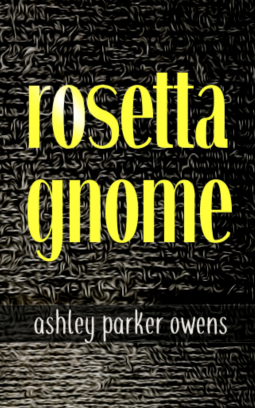
Rosetta Gnome
by Ashley Parker Owens
This title was previously available on NetGalley and is now archived.
Send NetGalley books directly to your Kindle or Kindle app
1
To read on a Kindle or Kindle app, please add kindle@netgalley.com as an approved email address to receive files in your Amazon account. Click here for step-by-step instructions.
2
Also find your Kindle email address within your Amazon account, and enter it here.
Pub Date Oct 28 2021 | Archive Date Dec 02 2021
Talking about this book? Use #RosettaGnome #NetGalley. More hashtag tips!
Description
"In a mash-up of Alice in Wonderland and Sun Tzu's the Art of War, an inexperienced gnome joins a group of misfits plotting to free enslaved gnomes from ogre fields.
In a mystical world where food gardens flourish with the help of magic, Wil stumbles into a misfit group of escaped slaves that eagerly embrace him into their clan. Over time, Wil learns the clan members are thieves and malcontents, determined to destroy the ogre overseers in revenge for their use of slave labor. His new clan prefers illicit trade to garden labor. Despite his bias against their thievery, Wil grows closer to his radical family as disaster strikes. A rebellious but beloved member seeks to take over the clan by murdering the current leader.
Shifting loyalties complicate the ensuing trial. Through a twist of fate, Wil finds himself in an unenviable leadership position. Wil’s first task includes executing the accused killer as an act of justice. Unable to carry out this cruelty, Wil hatches an escape plan for the alleged criminal.
As a leader, Wil faces an onerous internal dilemma. He can either adapt his beliefs to become an unethical leader to gain his clan’s freedom. Or, Wil can continue to alienate his new family with his strict morality and possibly lose them all.
Advance Praise
"A smart and imaginative fantasy that explores the secret life of oppressed gnomes.
Rosetta Gnome presents a reality where gnomes are slaves to ogres, working in vegetable fields under horrific conditions. In this world, magic is complex, beautiful, and forbidden to interfere with the societal structure. There’s a terrible, infectious sickness called Stone Disease where gnomes, usually unseen by humans, gradually turn to stone and shrink down, becoming visible to people.
The story opens with Wil, a newly orphaned gnome, running away from the traumatic events of the previous book, Gnome Harvest. He’s been forced to flee from his home along with a rabbit companion who helped save his life. The deep discriminatory belief held about rabbits in this society will feel familiar to readers of marginalized identities. It’s fascinating to witness these recognizable divisive and poisonous ideologies set in the author’s imagined world.
In addition to indoctrination and discrimination, the novel explores the profound impact that loss and separation has on generations of families after a rebellion. Wil stumbles upon a mysterious but welcoming group who invites him to join them, as long as he keeps the rabbit outside. Through this crew, we learn about gnome worker solidarity and whispers about plans to free those still enslaved. The rogue gnomes venture out on mysterious quests of liberation, risking imprisonment, enslavement, and being put to death.
This misfit crew includes a cat who speaks and thinks exclusively in army strategy terms, a young gnome who mixes perfume potions, an older one struggling with addiction, and an agoraphobic gnome who keeps them all well fed. With the story alternating between their perspectives, we experience the loneliness and longing in each of them—for a family they can trust, a home that’s safe, and to truly understand the enemy they face. Each of the misfits is haunted by their pasts, harboring secrets and plans of their own which contradict the teams’. They all grieve quietly for things they lost in their respective escapes from slavery, but never speak it aloud.
Rosetta Gnome’s worldbuilding is presented gradually and subtly, with striking imagination. The author has created belief systems and idiomatic phrasing that relates to the natural world these gnomes inhabit. The characters live with bad omens and a mythology rooted in terror; they’re motivated by the necessity for safety in numbers. Amidst the endless cycles of conflict between them, there are kidnappings, prophesies, and hallucinations. When a disastrous fire occurs, we watch the gnome council’s legal process at work, and the group confronts the reality of the death penalty.
In the novel, planting vegetables outside of enslaved work is illegal, and Wil misses his personal vegetable garden fiercely. He works with his new companions to plant flowers, but it is not the same. The author conveys this longing for gardening throughout the book with poetic, lyrical descriptions of blooming, flourishing plants.
The book largely focuses on the nuances of relationships between gnomes living under oppression. There are several off-putting, patronizing comments about and toward the novel’s young female characters, but these uncomfortable moments are used as points of relevant conflict between the men, reflecting the gnome society as patriarchal and with problems.
Rosetta Gnome will appeal to readers who enjoy post-apocalyptic found family stories, where suspicion rules relations and loyalty must live alongside desperation. The ending leaves room for a dark and twisted follow-up story and a new character to influence the gnomes’ fate.
Reviewed by Andrea Marks-Joseph, Independent Book Review, www.IndependentBookReview.com
Available Editions
| ISBN | 9798755591126 |
| PRICE | $6.99 (USD) |




